Football in the blood: History, heritage accompany Jake Spavital's inaugural season at Texas State
Jayme Blaschke | September 16, 2019
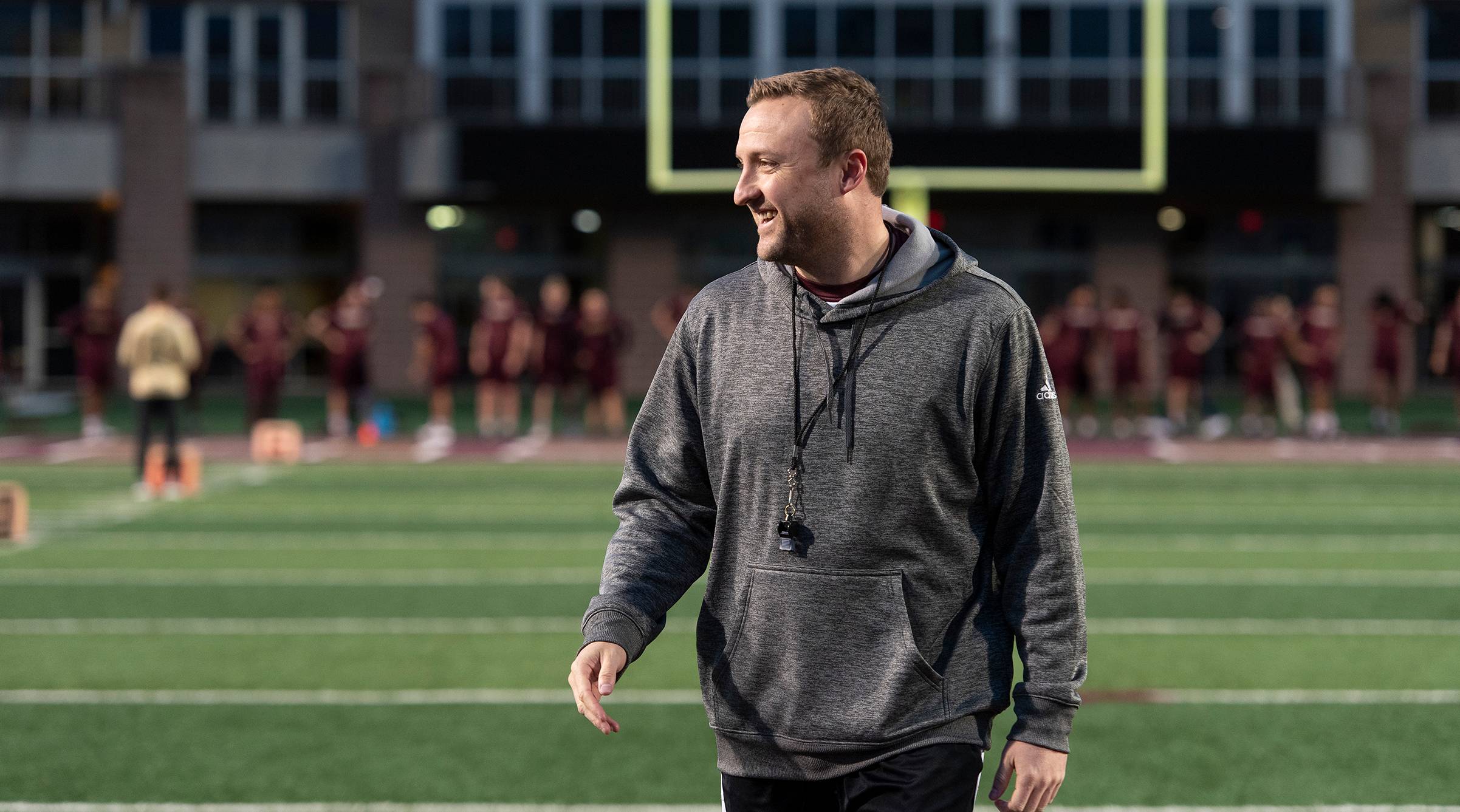
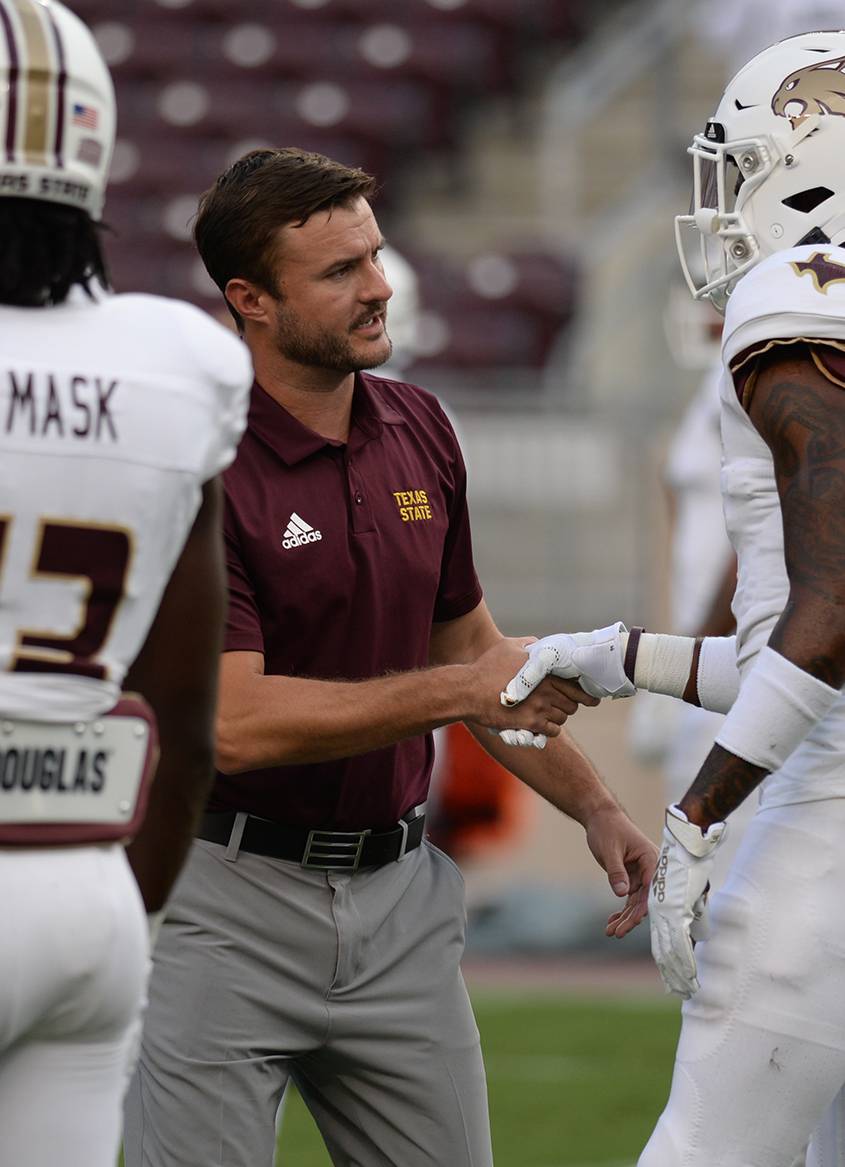
Texas State University Head Football Coach Jake Spavital was practically born into the game. Football runs in his family, so to speak.
His grandfather, Jim Spavital, played in the National Football League, Canadian Football League and the All-American Football Conference, before trading in his helmet and pads for a coach's whistle. His father, Steve Spavital, spent decades prowling the sidelines as a high school coach in Oklahoma, and his brother, Zac Spavital, can be seen this fall at Jim Wacker Field as the Bobcats' defensive coordinator.
That last one almost didn't happened. Late last fall, Bobcat faithful went into a panic over internet reports that the Arizona Cardinals' head coach, Kliff Kingsbury, had offered Jake Spavital a position with that NFL team. The crisis was quickly defused, but overlooked at the time was the fact that Kingsbury—along with a number of other college and pro teams—was also keen on adding Zac Spavital to his coaching staff.
"Zac is a wanted coach. Obviously, the Cardinals wanted him and I had a lot of teams come through—some were in the college football playoff—that were interested in talking to him," Jake Spavital said. Other teams were stiff competition, but the chance to run the Bobcats' defensive side of the ball, top to bottom, proved too much to pass up. "I gave him full autonomy to call the defense, and he's ready to do it. He understands the role of defensive coordinator and understands how it works. I've bounced a lot of ideas off him over the past years, because he is really good at what he does.
"He's been my biggest asset. If there's something that's not right, and I haven't seen it yet, he goes and fixes it without me knowing," he said. "That goes back to the whole ego thing. We've all set our egos aside. Everyone's just trying to make the program better. I never even asked them to, but the whole staff will be in here at 4:30 in the morning, working out, talking and trying to figure out the best things for the team. I've got a very ambitious group of guys here who just want to win and are devoting a lot of time to it."
Whenever a new coaching staff takes over a program, there are inevitable growing pains as players and staff go through a learning curve. There are new schemes, new plays, new expectations. Easing the transition for the Bobcats is the fact that former head coach Everett Withers ran a spread offense at Texas State, with a 3-4 defense. Jake Spavital's background is in air raid, spread-type offenses, and this year's team is expected to utilize a 3-4 defense mixed with nickel packages. Although the offense and defense schemes aren't identical to those of previous years, the shared fundamentals should make it easier for the coaches to make adjustments to maximize the player talent available.
"You have to know your personnel. That's what it comes down to. Zac's been a very multiple guy from a defensive perspective. He was a three-down-linemen guy at Texas Tech, he was a four-down-linemen guy when he learned under Bob Stoops," Spavital said. "We don't have a lot of defensive linemen. We have a lot of linebackers, so there's going to be that three-down element, because that's how you're going to adjust to the available personnel.
"From an offensive perspective, you've got to see how many tight end bodies you have," he said. "You'd like to have a strong tight end presence, because that position gives you the element of able to run the ball and still run your spread concepts."
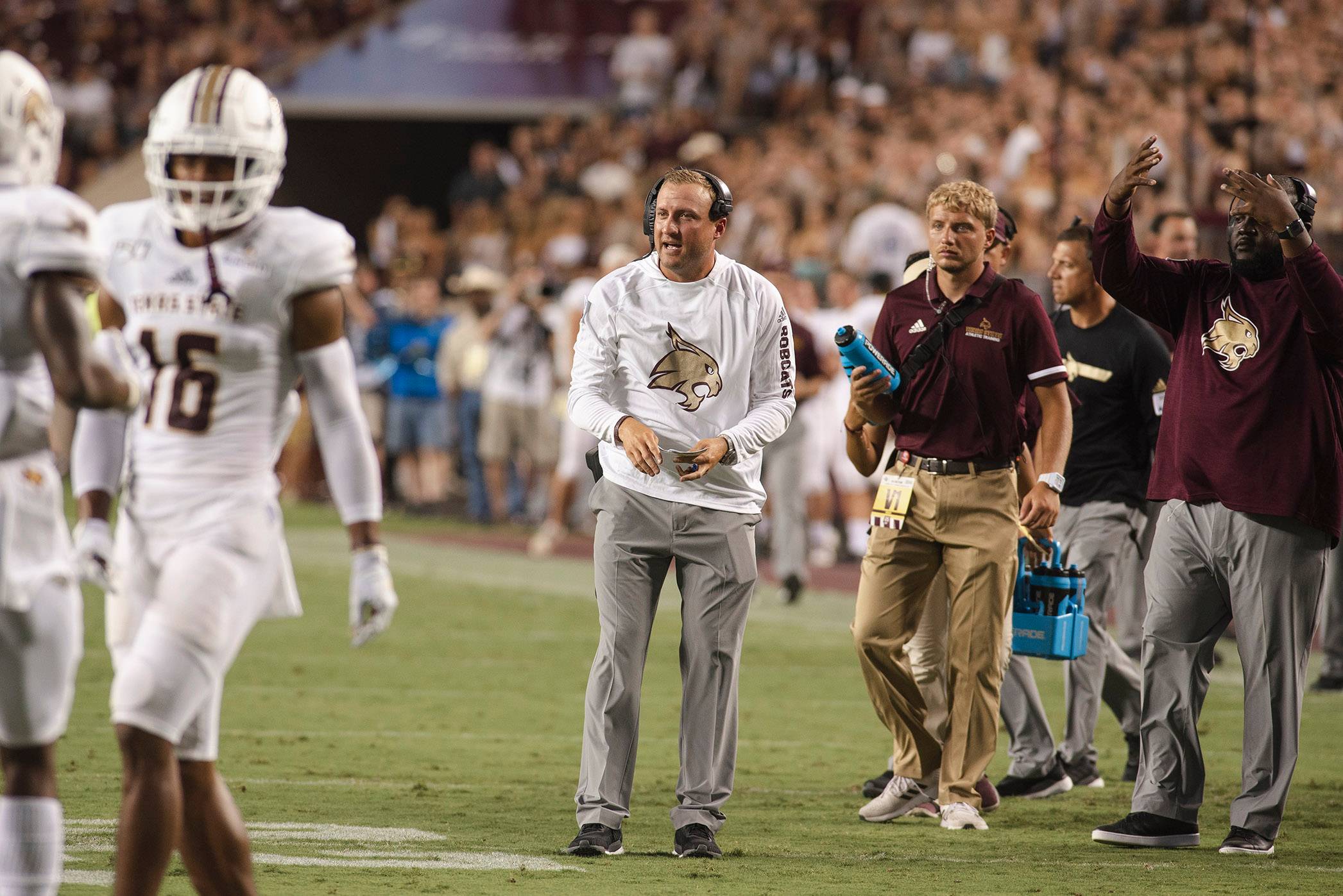
As recently as a decade ago, the tight end was a nearly-forgotten position in the NFL and college ranks, used almost exclusively as a run blocker. Unlike other linemen, tight ends are eligible to catch passes, and that flexibility has become a valued commodity in modern offenses. In 2010, the NFL's New England Patriots and Green Bay Packers drafted powerful tight ends with exceptional receiving ability, and the added dimension they brought to their respective teams had the rest of the league soon following suit.
"That's where the evolution of the game has gone, you know, the Rob Gronkowski's of the world, the Jimmy Grahams that can do it all. Now it's the most important position in the NFL, besides the quarterback, obviously. Those are the guys that cause so many matchup problems. When you have a guy who can stretch the field vertically and make plays, but then also attach to the line of scrimmage and be another blocker for the run game? That's the best of both worlds. That's why those guys are just so valuable to the game right now," Spavital explained. "[Former Bobcat tight end] Keenan Brown last year was a great example of what we're looking for. Now, do we have one of those guys on this year's team? I don't know. But we have the ability with our schemes to spread out the opposing defense with more receivers.
"What you've got to get down to is, 'Who are our best 11 players that we're going to put out there? Is it tight ends? Is it four receivers?' And then you adjust accordingly," he said. "When I went into Cal Berkley, we didn't have a tight end so I played four or five wide receivers the entire game. At Texas A&M we had tight ends. At West Virginia I had two unbelievable tight ends, so I utilized those guys as much as I could. It just comes down to common sense. Who are our best players? You have that direction according to the scheme you're running, and you start recruiting where you can be as multiple as possible."
Recruiting is the lifeblood of any college football program, and can be notoriously cutthroat. For Texas State, the advantage of recruiting primarily in Texas—a state known as a hotbed of high school football talent—is mitigated by having to compete with high profile programs from the Power 5 conferences for those prospects. The top high school players, the 5-Star Blue Chip athletes, are well-known by the recruiting services and fan sites. All the big programs know about them and aggressively recruit them. The best way for the Bobcats to compete with more storied programs on the recruiting trail is through the long-term building of relationships. Establishing respect and trust with high school coaches can pay off for Texas State, identifying those players who, for whatever reason, are overlooked by bigger programs but posses the football instincts and determination that could lead them to become the next Michael Strahan or J.J. Watt.
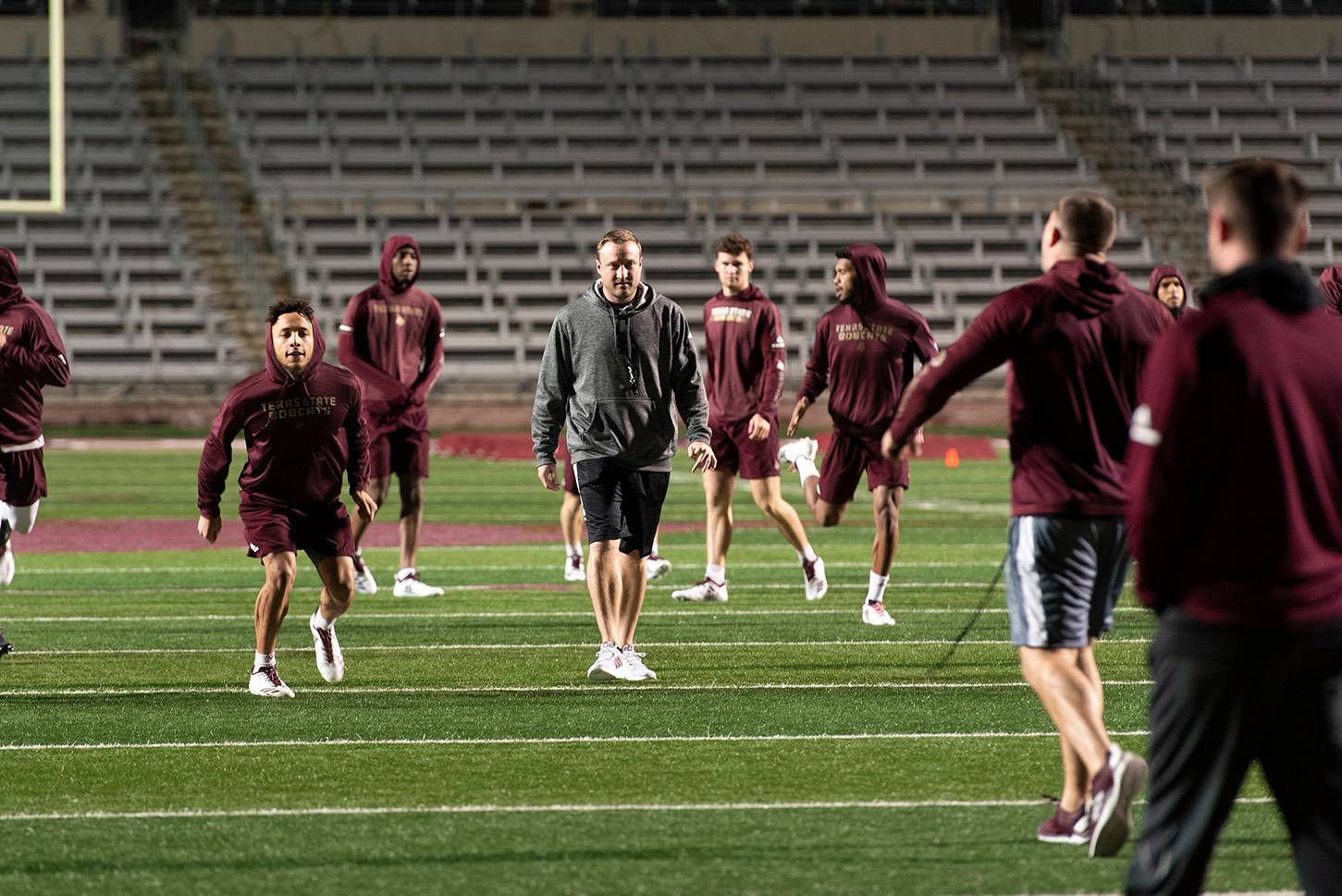
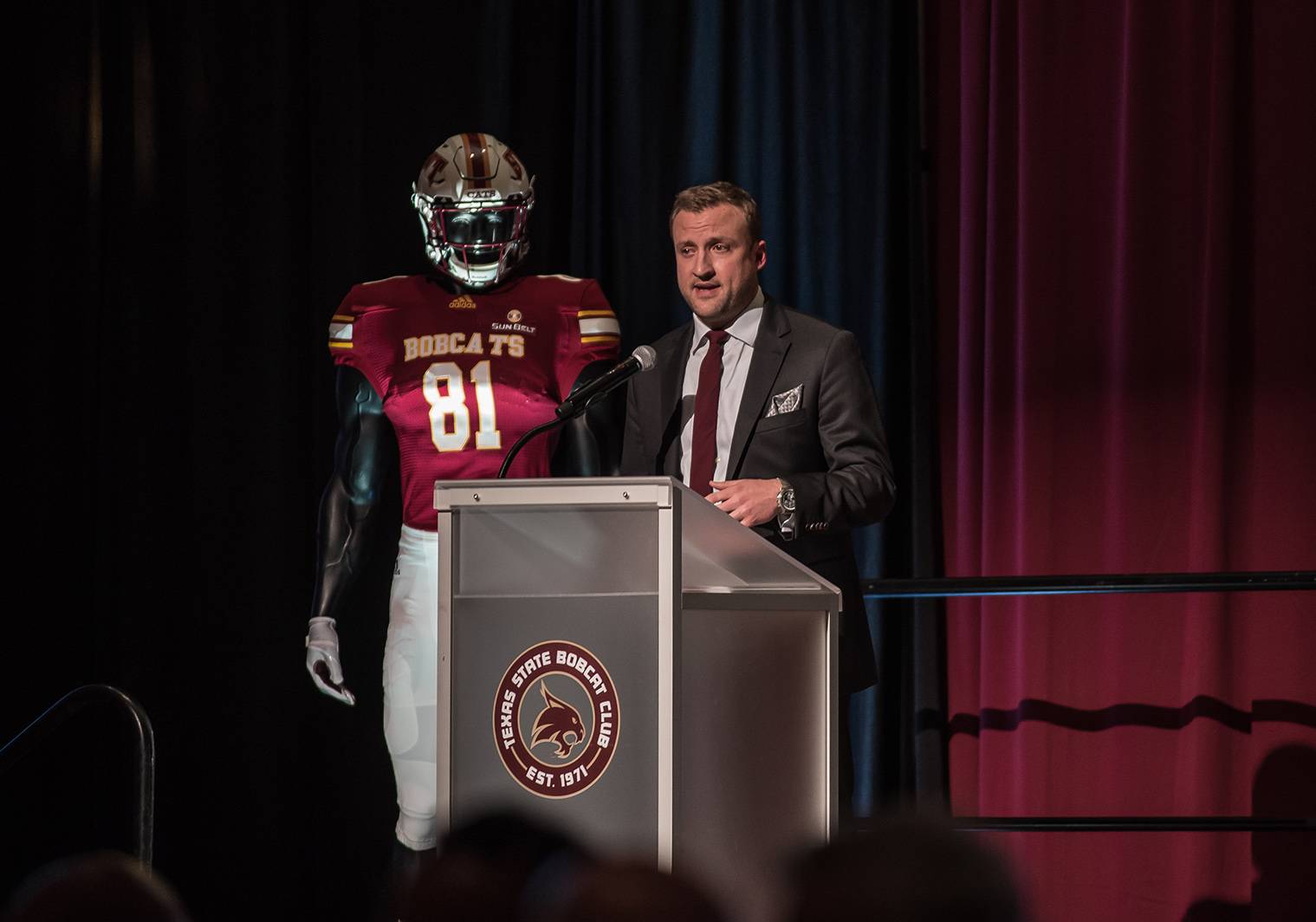
"High school coaches are the key, especially in this state. Now with technology [the internet, Twitter, texting, etc.] it's possible to eliminate that third party. You can recruit the kid without ever talking to the coach," Spavital said. "I've met with a lot of the board of directors from the Texas High School Coaches Association, and they are pretty adamant about having the college coaches who are going to recruit this state try to keep the high school head coach involved, so we can keep [the recruiting process] as clean as possible.
"It's pretty impressive how those high school coaches interact and take pride in these kids. I've always gone through the head coach because I'm a high school coach's son," he said. "There's that part of me that always wants to keep the head coach involved with everything that's going on, and shoot 'em straight with everything. There's a side of relationships with those coaches, and they can lead you in the right direction. In this state especially, it's very powerful.
"With schools like Texas State, you've got to roll your sleeves up. You've got to do the dirty work. Anyone can pull up a website and know all the top talent in the state of Texas—the guys who are going to go play at the major Power 5 level. But you know, here, we have to find those potentially great players who aren't on those websites. Some of those guys just slip through the cracks," he said. "You've got to build relationships and communication lines with these coaches so you can find those players. High school coaches can lead you in the right direction. That's important."
Over the course of his coaching career, Spavital has developed the reputation of being something akin to a "Quarterback Whisperer," and it's not hard to understand why. The list of record-setting quarterbacks he's worked with in the college ranks is absolutely ridiculous: Case Keenum (University of Houston), Brandon Weeden (Oklahoma State University), Geno Smith (West Virginia University), Johnny Manziel (Texas A&M University), Davis Webb (University of California, Berkley) and Will Grier (WVU). Perhaps the only thing more impressive is the list of offensive innovators he's coached under, including Gus Malzahn, Kevin Sumlin, Sonny Dykes, Mike Gundy and Dana Holgorsen. At each stop along the way, Jake Spavital was learning, incorporating elements from each that would inform his outlook on coaching.
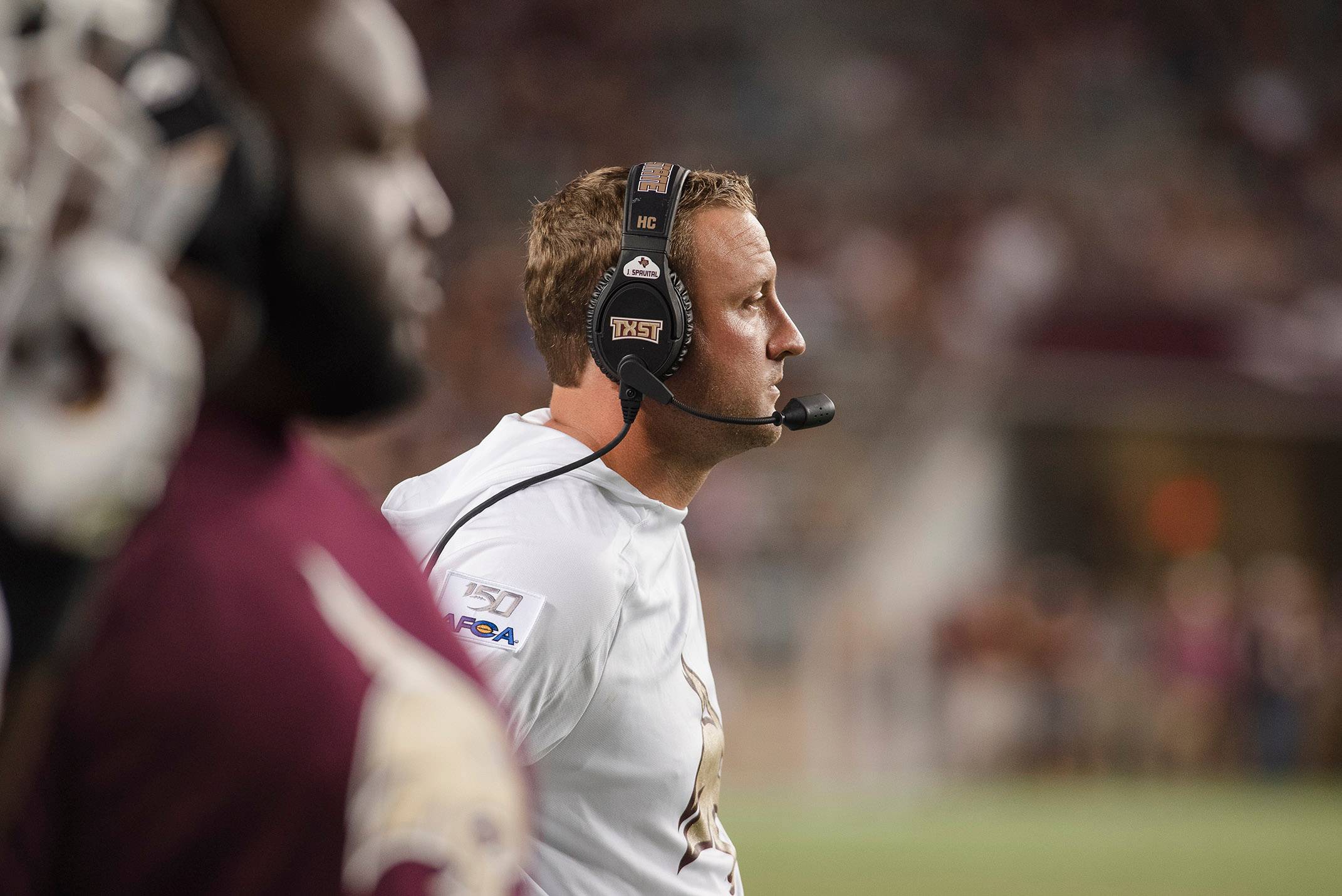
"I've taken bits and pieces from everybody. Then again, I've been very fortunate. There is no right way to be a head coach. That's the advice they've all given me. There is no book—you learn by walking in each day and figuring out how you can make it better, and don't try to be someone that you're not," Jake Spavital said. "Dana's got a different personality than Kevin and Gus and Kliff. You have to utilize your strengths and build off that.
"You look at each guy and how they run their organization, and you try to pick bits and pieces from them all, because they all are exceptional men and they bring a lot to the table. They are very successful in what they do and I've just been very fortunate to work for them," he said. "You sit there and you go through a lot of different situations with these guys, from handling a Heisman Trophy winner, first-round draft picks, or a guy getting kicked off the team, or an incident that happens. You just take notes on how they handle it. As a coach, you're going to get ridiculed regardless of the outcome, so you just have to do what's best for the team. That's the thing I've gotten out of all of these guys—they lead you in the direction of being team-oriented."
While Spavital is firmly focused on the current season with the Bobcats and laying the foundation for the program's first-ever bowl bid, several states to the west his good friend, Kingsbury, is doing much the same with the Arizona Cardinals. Spavital turned down his friend's offer to join the professional ranks because the timing wasn't right. In truth, the timing may never be right. Some coaches aspire to the NFL as the pinnacle of their profession. Others find they prefer the pageantry of the college ranks. At this point in his career, Spavital isn't entirely sure where he falls on that spectrum.
"I've gone back and forth on this. My grandfather [Jim Spavital] coached in the NFL. He was actually Joe Namath's coach at the Jets. He was with the 49ers, and coached in the CFL, USFL, World Football League and all of that," Spavital said. "He's been in those professional ranks, where quality of life is probably a little bit better, in terms of hours that you put in. You put all those hours in during the season regardless of whether you're coaching in the NFL or college, but in pro leagues the offseason is the offseason. In college, there's the recruiting aspect. There's no offseason in college.
"I flirted with it when I was leaving A&M. I thought of getting into the NFL, and I almost took a job with the Chicago Bears. It's a give and take. I like the relationships with the student-athletes, the players," he said. "I'm a coach's kid, a high school coach's son, and I like that interaction, whereas in the NFL, it's very business-oriented.
"I'm going to be happy regardless, just coaching football, but there's that element, that human element, of building relationships with your current players that's very important to me."
Share this article
For more information, contact University Communications:Jayme Blaschke, 512-245-2555 Sandy Pantlik, 512-245-2922 |